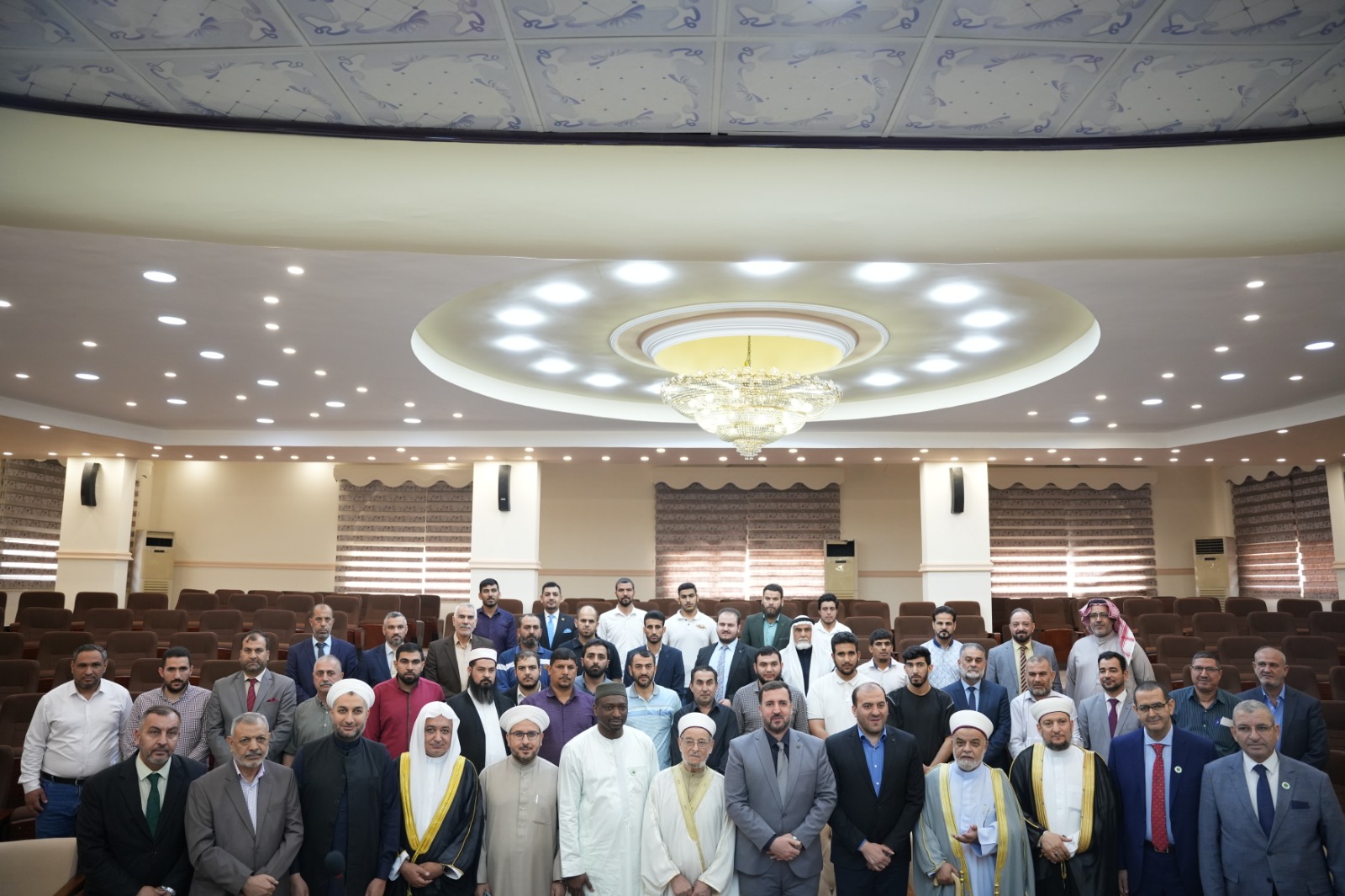
At the generous invitation of H.E. Dr. Salah al-Din Falih al-Taha, Dean of Imam Al-Azzam College in Baghdad, H.E. Prof. Koutoub Moustapha Sano, Secretary General of the Academy, delivered a lecture on Monday morning, 19th Ramadan 1444, corresponding to 10th April 2023, delivered a scientific lecture on the role of Fiqh academies in facing with developments.
His Excellency began his lecture by expressing his sincere thanks and appreciation to the Dean of the College for inviting him to deliver this lecture to the faculty and postgraduate students, praising the straight intellectual position and the ancient scientific history of this college which dates back to more than a thousand years, where great scholars and thinkers graduated from, noting that it remained lofty and steadfast despite the difficulties it faced throughout history.
On this occasion, His Excellency expressed his wishes that this college would remain a permanent source of refuge for him in order to continue to prepare generations capable of various types of science and knowledge in order to preserve the heritage of the imams of knowledge and thought who lived in the city of Harun Al-Rasheed and enriched the Islamic library with valuable scientific literature and valuable intellectual books. One of those imams is the greatest imam Abu Hanifa al-Nu`man ibn Thabit, his two companions Abu Yusuf and Muhammad ibn al-Hasan al-Shaibani, Imam al-Shafi`i, Imam Ahmad ibn Hanbal, and other imams of guidance and piety.
His Excellency then touched on the topic of the lecture, indicating the reference basis and the legal basis for Ijtihad in general, and collective Ijtihad in particular. Sharia in its texts depends on ijtihad, just as the application of legal rulings in incidents depends on ijtihad, and therefore, it has proceeded until the Day of Resurrection, and its door has not and will not be closed until the Day of Judgment. His Excellency confirmed that the most correct of the sayings of the scholars is that the Messenger of Allah, PBUH, was a mujtahid, and trained his companions on Ijtihad, and approved them for many of their diligences, explaining in the meantime that the jurisprudence attributed to the Messenger of God, the predominant character of the group was except for what was rare, as he, gathered the great companions to consult and reflect on calamities in which no revelation was revealed, and he reported to what the majority of those gathered approved, and acted upon, for collective Ijtihad in public issues and calamities, thus inspired modern collective Ijtihad through the local, regional, and international jurisprudence academies, leading to a mature formulation of legal rulings that are appropriate to those calamities and developments. His Excellency explained that the International Islamic Fiqh Academy emanating from the Organization of Islamic Cooperation is the largest contemporary institution for collective ijtihad, as it is the only supreme jurisprudential reference in the world whose members consist of the leading scholars of the eight Islamic schools that Muslims follow today in all parts of the globe. His Excellency also made it clear that the International Islamic Fiqh Academy deals with three types of general issues, which are the general calamities about which no text was mentioned and did not affect the predecessors’ jurisprudence about them. This is true of the Corona pandemic and a number of contemporary cataclysms in the field of medicine, sociology, and economics. As for the second type of general issues that the Academy deals with, it is represented by the developments and changes that occurred in many issues and issues that deeply affected their reality, which requires a renewal of diligence in them. Contemporary jurisprudence that verifies those changes and developments, and this applies to changes in contracts, obligations, transactions and sales. As for the third type, it is represented in reviewing previous jurisprudence in the light of the situations and conditions that have witnessed and are still witnessing continuous change, in application of a rule that does not deny the change of the fatwa with the change of times, places and conditions. His Excellency concluded his speech by renewing the call to review the curricula in universities, institutes and colleges to inoculate them with content and contents that enable their graduates to participate positively and effectively in dealing with their realities in a sober way that integrates transmission and reason and makes them good citizens who achieve vicegerency to Allah on earth, building the universe, and achieving human happiness. immediately and eventually.
The lecture received great praise from the audience, and it as moderated by the eminent scholar Sheikh Dr. Ahmed Hassan Al-Taha, head of the Iraqi Fiqh Academy.
At the end of the lecture, the Dean of the College presented the college shield to His Excellency, and thanked him for his lecture.
Read Also
Lastest








